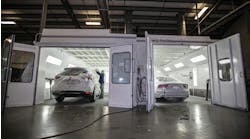WHOLESALE: Convenience is king
Brian Keith, president of Birmingham, Ala.-based Walter S. White Auto Parts, notes that his company's website adheres to the KISS principle (Keep It Simple...and Straightforward).
"On no page should you have to scroll down, for example," he says of WalterSWhite.com. "When a page appears on your screen, all of its information is in place.
"We try to solicit feedback as often as possible from our customers, and they all seem pretty pleased with its efficiency," he adds.
When Keith joined his father-in-law's company in 1974, fresh off a stint with IBM, he convinced him to computerize inventory."In 1976, we were the first guys in the state to use the TRIAD system," he recalls.
By 2004, Walter S. White was ready for a Web-based system. While "hits" were slow in coming that summer and fall, by the end of 2004, customers were regularly visiting the site."I think work slowed down in winter to the point where they could nose around online," Keith says. "They found it easy and less time-consuming than being on the phone. There's just a name and password to fill in, and they can specify whether they want to work with their local store or any of our stores. They can hold items while their customers decide, and then come back and order."
Mike Riesgraf, president of Campbell Auto Supply in Portage, Mich., notes that his wholesale site has been up a lot longer than his retail site. Because technicians can simply log onto the password-protected site and browse his inventory, Riesgraf notes it's alleviated some of the load on his sales staff.
"When you're fielding two or three calls for the same order, having them answer some of their own questions just by looking online helps," he explains.
Riesgraf also sees it as a competitive advantage. "Dealers are becoming more comfortable using it, and it's more convenient for them to log on early in the morning or late at night — I don't have to be here," he says. "When I get in, I see the orders on the printer."
However, not every jobber is eager to embrace Internet commerce. Jack Darlington, president of Midway Auto Supply in Norton, Mass., says he's too busy at the store to pay much attention to his site, MidwayAutoSupplyInc.com.
"I would say 1 in 10,000 orders is Internet-inspired," he admits. "We don't use it at all — it basically just lets people know we're here.
"We're so busy just trying to stay alive that no one really pays attention to it," he continues. "Right after we got online, we got an e-mail request for a 1976 Cutlass headlight from Kansas. You can't tell me there weren't 10 stores within 20 miles of this guy who could get him a headlight. Why come to me? I think he was probably just on the Web, looking for a company and found us."
However, Darlington says he expects having a site will become more important in the future, noting that factory representatives often contact him by e-mail already. "Out of necessity, we'll have to be Internet-friendly," he says.
"I'm always soliciting new business, but no one has ever said to me, 'Gee Jack, I'd do more business with you if you were on the Internet,'" he adds.
Similarly, Riesgraf doubts he will make retail ordering available on CampbellAutoSupply.com. "It might make sense in the future if we make the capability of 'dealers, click here' and 'retail customers, click here,'" he says. "But most of our sales are local — no mail-order stuff."
Keith says he's surprised that of the 43 percent of his customers who use his site, less than 20 percent actually order online.
"There's still a double handful that browse the site, find what they want, write it down and then call it in," he says. "We ask, 'Why didn't you just click?' They're still not ready to hit the 'send order' button."
RETAIL: Computers are commonplace
With Internet access becoming as much a staple of the home as a TV or telephone, the aftermarket has turned its attention to harnessing the Web's potential for marketing and purchasing. Some jobbers still look at a website presence as merely an informational listing of their contact information, but more and more are seeing the value in putting their inventory online.
Classic Auto Parts in Oklahoma City, Okla., for example, has been online for nearly a decade. It was a logical graduation to online commerce because the company began in 1974 as a mail-order business, says Publications Manager Cris Valerius, who also oversees ClassicAutoParts.com.
"We still have walk-in customers, but about 75 percent of our business is still mail-order," she estimates. "Over the years, I think people have become more comfortable with ordering online."
Valerius also points out that the Web has widened Classic's customer base considerably. "Search engines help a lot. We're seeing a lot more overseas customers from that," she says.
Joe Catalano, president of South River, N.J.-based Strauss Discount Auto and a member of Aftermarket Business' Editorial Advisory Board, notes that the Web is helping move along Strauss' evolution from parts-only to parts and service. Its interactive nature helps as a marketing tool as well.
"We put up coupons and special offers," he explains. "If we can drive people to the store with our site, we'll do it."
A listing is already in place for the nearly 100 Strauss shops, and Catalano says a store locator by zip code is in the works. Customers aren't able to schedule service appointments yet, but that, too, is part of a future plan, he says. They already can purchase items online.
Roanoke, Va.-based Advance Auto Parts is taking the power of the Web a step further by introducing free, downloadable "video how-to clinic" podcasts for the iPod on AdvanceAutoParts.com. Subject matter ranges from installing shocks to replacing brake pads.
"More than 11 million video iPods have already been sold since their launch last fall, a clear indication of this technology's convenience and growing popularity," Bryan Gregory, Advance's director of consumer education, said in a release. "We are excited to be a part of this incredible service."
Despite the advent of new technology applications, Valerius points out that standbys like phone orders and hard-copy catalogs are far from obsolete.
"We still put out 10 catalogs because most people still want a hard-copy catalog," she says. "They use the Web for easy access or ordering when the store is closed, but they want to be able to flip through the pages of a catalog."




